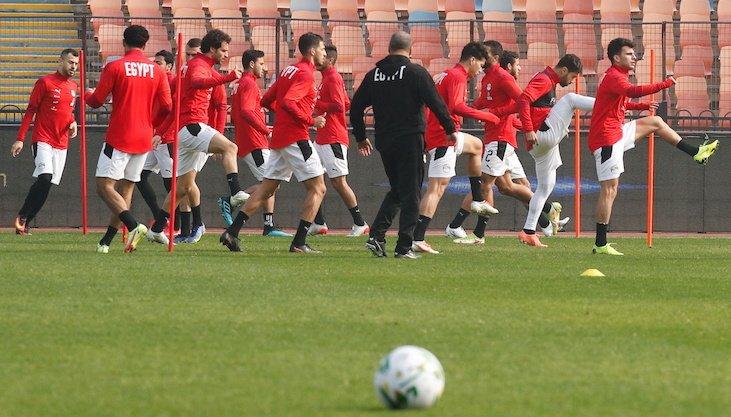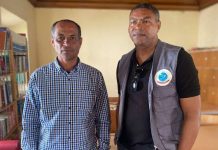Africa-Press – Cape verde. Djamel Belmadi does not have the reputation of being an excessively superstitious man, nor of spending his time digging into the past to find the answers for the future.
But in the entourage of the pragmatic Algeria coach, who won the African Cup of Nations (CAN) in 2019, others may have taken it upon themselves to consult the competition’s archives to remind him that only three teams – Ghana (in 1965), Cameroon (in 2002) and Egypt (in 2008 and 2010) – had been able to retain their titles.
Algeria is therefore warned. And it cannot ignore that only two North African teams have been crowned in the sub-Saharan part of the continent: Morocco in Ethiopia in 1976 and Egypt in Burkina Faso in 1998, then in Ghana in 2008 and finally in Angola in 2010.
Algeria, the favourite Despite everything, Algeria is considered the objective favourite of this 33rd edition of the CAN, simply because it has not shown any weakness since it won in Cairo in July 2019 against Senegal (1-0).
Vahid Halilhodzic, the coach of Morocco, said it himself, carefully omitting to mention the name of the Algerian team, which he coached from 2011 to 2014, for reasons mostly related to realpolitik concerns amidst the conflict between the Moroccan and Algerian governments.
The Fennecs continue to play well, to score many goals and not lose, carried by an armada of individual strengths (Riyad Mahrez, Sofiane Feghouli, Islam Slimani and Baghdad Bounedjah) and the charisma of their coach, who has not deviated from his principles of play since the win in Egypt.
The Algerians, Djamel Belmadi in the lead, assume the status of favourite, while knowing that the CAN is a competition capable of delivering surprises.
They are the perfect illustration, since in 2019, Mahrez and his teammates were not cited among the favourites, unlike Egypt, Morocco, Senegal, Cameroon or the Côte d’Ivoire.
Cameroon also left the competition in Gabon with a trophy that nobody – or almost nobody – expected, and Zambia danced on the belly of the Ivorian Elephants in 2012.
A Samuel Eto’o effect? Many predict a big name will be at the top of African football table on 6 February rather than an outsider out of nowhere. Cameroon immediately comes to mind, and not only because it will be playing at home – an advantage that only Egypt exploit in 2006.
The Indomitable Lions are coming off a very decent 2021, and on paper, they look good. The Cameroonians are also betting, with that touch of superstition that often accompanies footballers, on the Samuel Eto’o effect. He was elected president of the Fécafoot on 11 December and is known for having been on the winning team of the CAN twice (in 2000 and 2002).
Among the other contenders, since all the big African countries – with the exception of South Africa and the DRC (two former winners) – have qualified, Senegal, a finalist in 2019, Egypt, Morocco, Tunisia, Côte d’Ivoire and possibly Nigeria and Ghana stand out, but in no particular order, since prediction remains a rather subjective science.
And since football is the team sport, it is not so far-fetched to list those who could, like the Zambians in 2012, upset the established order: Mali, Burkina Faso, Gabon and Guinea have the profile. The first two have a tight-knit team and the others have world-class individuals in Pierre-Emerick Aubameyang and Naby Keita.
The rest of the field is composed of regulars (Cape Verde, Guinea-Bissau, Zimbabwe), some returnees (Sierra Leone, Malawi, Sudan, Ethiopia, Equatorial Guinea), a confirmation of 2019 (Mauritania) and two newcomers, Gambia and Comoros. The ambitions of all this small world are obviously very far from those of the other participants. Disrupted preparations
Cameroon, which was supposed to organise the competition in 2019 and which was several times politely but firmly invited by the Confederation of African Football (CAF) to accelerate the pace of work, has sometimes worried in the face of rumours of cancellation, relocation (to Qatar or Algeria in particular) or postponement, called for by Gianni Infantino, the FIFA president.
Despite the pressure exerted by some of the most powerful European clubs, worried at the prospect of seeing their players leave for several weeks, who tried until the end to scupper the organisation of the tournament, Yaoundé held firm.
But this disrupted the preparation of several teams, forced to wait until 3 January, instead of 27 December, to have their full complement of players.
The Covid-19 pandemic did the rest, precipitating the cancellation of several friendly matches (Algeria-Gambia, Côte d’Ivoire-Comoros, Gambia-Syria in particular).
Finally, four coaches, the French Hubert Velud (Sudan), Didier Six (Guinea), Corentin Martins (Mauritania) and the German Gernot Rohr (Nigeria), who had qualified their team, were dismissed a few weeks before the CAN. A foretaste of what will happen once the competition is over, when, as in 2019, other heads will fall
For More News And Analysis About Cape verde Follow Africa-Press






